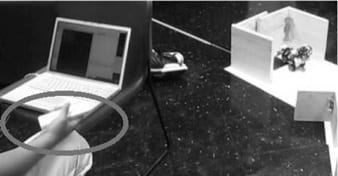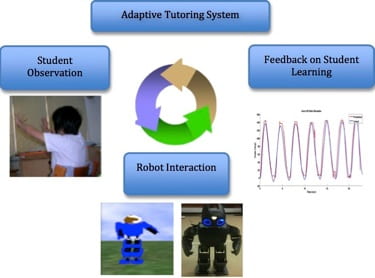
Accessible Robotic Programming for Students with Disabilities (ARoPability)
Lead Engineers: Chung Hyuk Park, Ayanna Howard
Robotics-based activities has been shown to encourage non-traditional students to consider careers in computing and has even been adopted as part of core computer-science curriculum at a number of Universities. Unfortunately, the concept of non-traditional student in this arena has not traditionally extended to encompass students with visual or physical impairments. As such, we seek to investigate the use of alternative interface modalities to engage students with disabilities in robotics-based programming activities. We seek to answer questions such as “What characteristics of robotics-based activities need to be transformed to engage students with visual impairments?” “What technologies can be adapted to enable achievement of robotics-based programming activities for students with physical impairments?” “Are there existing teaching modalities already employed by educators that can be used to train these new computing professionals?” and “What methods can be exploited to broaden participation in computing for students with visual or physical impairments?” This NSF effort targets middle and high school students in order to engage during the critical years and hosts a number of robotics camps in conjunction with the Center for the Visually Impaired, the National Federation of the Blind, and Children¹s Healthcare of Atlanta at Scottish Rite.
Education and Robotics




Robot Tutor-in-a-Box
Lead Engineers: Douglas Brooks, Ayanna Howard
In recent years, there has been a verifiable increase in the use of virtual agents for tutoring ranging from the K-12 classroom to medical schools. Although results are varied, studies have shown evidence that the use of tutoring agents results in improvements in math education, reading, and even practicing surgical skills. Unfortunately, training individuals from diverse backgrounds requires customized training approaches that align with individual learning styles. Scaffolding is a well-established instructional approach that facilitates learning by incrementally removing and/or augmenting training aids as the learner progresses. By combining multiple training aids (i.e. multimodal interfaces), a trainer, either physical or virtual, must make real-time decisions about which aids to provide throughout the training scenario. Unfortunately, a significant problem occurs in implementing scaffolding techniques since the speed and selection of the training aids must be strongly correlated to the individual traits of a specific trainee. As such, in this work, we investigate methods for identifying the different learning styles of students and use this information to adapt the training sequence of a robot tutor. This involves investigating the use of multi-modal interfaces, such as associated with various forms of textual, graphical, and audible interaction, as well as socially-interactive robot behaviors to engage and build pathways to individualize learning.
The ARTSI (Advancing Robotics Technology for Societal Impact) Alliance is a collaborative education and research project centered around robotics for healthcare, the arts, and entrepreneurship. Spelman College, a historically black college (HBCU) for women is leading the alliance in partnership with several other HBCUs and Research I (R1) institutions. Georgia Institute of Technology is one of the R1 members with a focus on training and mentoring in the area of healthcare robotics.
Mars 2020
Computer adventure games has grown in appeal to the younger generation, and yet, exposure to adventure games alone does not provide direct mechanisms to improve computer-science related skills. As such, we have developed a robotic adventure game that embeds high-level computer science concepts as part of the game scenario. The explicit purpose of this delivery mechanism is to introduce middle school students to fundamental concepts of programming. The underlying model is that by capitalizing on the popularity of computer games to teach basic computer science concepts to younger students, we can increase their desire to pursue a STEM-related career in the future. These robotics and computer science concepts are taught through a number of Saturday and summer middle-school camps held at Georgia Tech throughout the year.



For more information, please contact: Chung Hyuk Park and LaVonda Brown
| Robot Learning | Assistive Robotics | Education and Robotics | Space Flight Life Support Systems |

